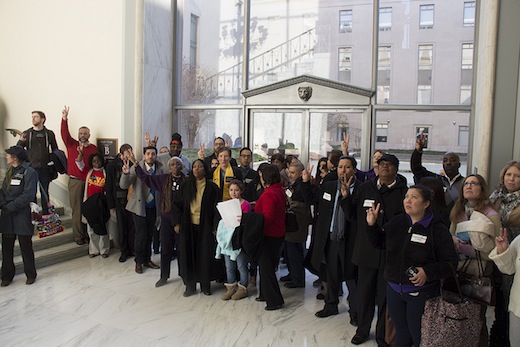
The leadership of the Republican Party in the House of Representatives issued its list of principles for immigration reform last week. This will kick off a new debate on whether it is possible to pass comprehensive immigration reformed in this Congress.
The Republican principles, presented by House Speaker John Boehner of Ohio at a Republican retreat, are sketchy and a mixed bag, which give some things to the immigrant community but also impose severe new repressive measures. The main points are:
“Border enforcement and interior enforcement must come first”
It calls for “zero tolerance” for unauthorized entry into the United States or for overstaying of visas; the border must be “secured.” The principles also hint at preventing the president from using executive discretion over decisions about who will be deported. This is a slap at the DACA program initiated by President Obama in 2012, whereby most “Dreamers,” or young people brought into the country as minors, are spared deportation.
“Implement entry-exit visa tracking system”
It would require the full implementation of a biometric tracking system to make sure that the government knows whether people allowed to enter the country have stayed or left.
“Employment verification and workplace enforcement”
This seems to points to mandatory electronic verification of the authorization to work of all workers.
“Reforms to the legal immigration system”
Visas and green cards should be given more to highly trained people, including people with degrees from U.S. universities, rather than family members of U.S. citizens. Immigrants and their supporters want, rather, more stress on unifying families, and temporary workers should be brought in to meet the needs of agriculture and other industries, but should not be allowed to displace U.S. workers.
“Youth”
The principles appear to support the goals of the “Dreamers” to access legal residency and possibly citizenship, in spite of the fact that, as stated earlier, the Republicans oppose the DACA program. But to achieve this, dreamers would have to gain a college degree (not just a high school diploma) and/or serve in the U.S. Armed Forces.
“Individuals living outside the rule of law”
Undocumented immigrants could get legalization without a special path to citizenship, but only if they admit their culpability, pass “rigorous background checks”, pay significant fines and back taxes, learn English and U.S. civics, and “be able to support themselves and their families.” But this legalization could be obtained only after it is certified that “certain enforcement triggers” have been implemented.
In reaction, some activists and organizations said that it is good that at least something will now be introduced in the House. But earlier, Republicans in the House had said that they would be introducing bills piecemeal and not as a “comprehensive” package. From the point of view of immigrants’ rights, this is very dangerous. If, for example, the more repressive items in the Republican “principles” document were presented for legislative action first, there is the danger that their passage would cause the main item that immigrants’ rights activists are concerned about, namely legalization of the undocumented, would be forgotten. This would mean that the situation of the undocumented and their families could end up being much worse.
The AFL-CIO and others have objected strongly to the lack of a guarantee of a path to citizenship in the Republican principles. Some of the other items are much worse, especially those that cut off family unity legalization and impose more crackdowns. Few undocumented immigrants would say that they would prefer to be deported if they can’t have “a special path to citizenship;” their priority is an end to the mass deportations that are traumatizing entire communities.
It is also not clear what would be the situation of the undocumented immigrants once they were provisionally legalized without a “special path to citizenship”. Would the lack of a “special path to citizenship” mean that they could not get citizenship ever, or would it just take longer? Presumably, being legally in the country, they could join unions, travel to visit their relatives outside the United States (a big desire of undocumented immigrants) and other good things. But if they lost their jobs, would this mean that they would be deported because they would no longer “be able to support themselves and their families”? Would they be eligible for government benefits such as unemployment insurance, Medicare and Medicaid, Social Security?
Last year the Senate passed an immigration reform bill which has been sharply criticized for its restrictions and repressive elements. If the House passes a bill, or several, the Senate and House bills will go to a joint Conference Committee to reconcile their language. In the Conference, anything could happen. Before we get to that point, there are many blanks to fill in.
The immigrants’ rights movement pledges to keep pressing Congress while also continuing to demand that the Obama administration expand the suspension of deportation it has given to the Dreamers so as to include the widest number of undocumented immigrants possible.
Photo: Communication Workers of America activists joined more than 1,500 immigration reform advocates in occupying more than 200 congressional offices, Dec. 12, 2013. Activists from across the country prayed and held vigils. The song “We Shall Overcome” echoed through the halls of Rayburn House Office Building. (CWA/CC)












Comments